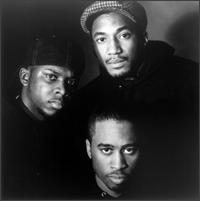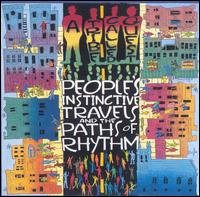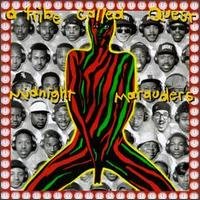Q-Tip
 The longtime MC with pioneering alternative hip-hop trio A Tribe Called Quest, rapper Q-Tip was born Jonathan Davis in New York City on November 20, 1970. While a student at the Murray Bergtraum High School for Business Careers, he co-founded A Tribe Called Quest with fellow students Ali Shaheed Muhammad and Phife (Malik Taylor) in 1988; the following year, Q-Tip guested on De La Soul's groundbreaking 3 Feet High and Rising LP, with the two groups forever linked through their association with the Native Tongues collective. Tribe's debut single, "Description of a Fool," appeared in the summer of 1989, and after signing to Jive Records, the trio issued their debut LP, People's Instinctive Travels and the Paths of Rhythm, a year later. With their fiercely intelligent, socially progressive lyrics and brilliant fusion of rap and jazz, the group emerged as one of the most popular and influential in all of hip-hop, producing such classic LPs as 1991's The Low End Theory and 1993's Midnight Marauders before disbanding in 1998. Q-Tip then mounted a solo career with the 1999 release of Amplified.
The longtime MC with pioneering alternative hip-hop trio A Tribe Called Quest, rapper Q-Tip was born Jonathan Davis in New York City on November 20, 1970. While a student at the Murray Bergtraum High School for Business Careers, he co-founded A Tribe Called Quest with fellow students Ali Shaheed Muhammad and Phife (Malik Taylor) in 1988; the following year, Q-Tip guested on De La Soul's groundbreaking 3 Feet High and Rising LP, with the two groups forever linked through their association with the Native Tongues collective. Tribe's debut single, "Description of a Fool," appeared in the summer of 1989, and after signing to Jive Records, the trio issued their debut LP, People's Instinctive Travels and the Paths of Rhythm, a year later. With their fiercely intelligent, socially progressive lyrics and brilliant fusion of rap and jazz, the group emerged as one of the most popular and influential in all of hip-hop, producing such classic LPs as 1991's The Low End Theory and 1993's Midnight Marauders before disbanding in 1998. Q-Tip then mounted a solo career with the 1999 release of Amplified. Just over a year after A Tribe Called Quest issued its final album, the group's nominal frontman Q-Tip issued his debut solo album, Amplified. For Tribe fans able to get over the fact that Q-Tip isn't trading off on rhymes with Phife Dog and Ali as usual, Amplified is an excellent work, almost up to the same level as the group's underrated final Jive album, The Love Movement. The sound here is very similar to The Love Movement, obviously no coincidence since production credits throughout go to Jay Dee and Q-Tip for the Ummah, the same combo that produced most of A Tribe Called Quest's material. It's a style that emphasizes deep grooves and clipped beats with a polished sheen that takes Tribe's jazz-rap into the age of quiet storm and fusion. Q-Tip's rapping is as smooth and inventive as ever, though it's a mild surprise that he doesn't include any message tracks (most Tribe albums have at least one or two). The band's breakup was a blow to hip-hop fans all over the world, but Amplified will make everyone feel much better.
Just over a year after A Tribe Called Quest issued its final album, the group's nominal frontman Q-Tip issued his debut solo album, Amplified. For Tribe fans able to get over the fact that Q-Tip isn't trading off on rhymes with Phife Dog and Ali as usual, Amplified is an excellent work, almost up to the same level as the group's underrated final Jive album, The Love Movement. The sound here is very similar to The Love Movement, obviously no coincidence since production credits throughout go to Jay Dee and Q-Tip for the Ummah, the same combo that produced most of A Tribe Called Quest's material. It's a style that emphasizes deep grooves and clipped beats with a polished sheen that takes Tribe's jazz-rap into the age of quiet storm and fusion. Q-Tip's rapping is as smooth and inventive as ever, though it's a mild surprise that he doesn't include any message tracks (most Tribe albums have at least one or two). The band's breakup was a blow to hip-hop fans all over the world, but Amplified will make everyone feel much better. A personal, unique project compared to Amplified (Q-Tip's first under his own name), Kamaal the Abstract fittingly sounds more like a solo album; whereas Amplified merely built on the digital soul of the last Tribe Called Quest album (The Love Movement), this one is wide-ranging and diverse, a relaxed, loose-limbed date. Q-Tip lays way back on these cuts, rapping in a quick, low monotone for the opener, "Feelin'," even while the song breaks into some restrained guitar grind on the choruses. Guitars, in fact, crop up all over this record. Setting aside comparisons to the contemporary record by N.E.R.D. (the rock side project of hip-hop super-producers Neptunes), Q-Tip crafted a record that pays homage to the last gasp of organically produced mainstream pop in the '70s and '80s, paying a large compliment to Prince and Stevie Wonder, even as he proves himself far more talented than D'Angelo (if not quite as soulful). The beats are pointed and clipped, to be expected on a Q-Tip record, but he allows plenty of space for the arrangements to speak, like the trim trumpet lines pacing "Even if It Is So" or allowing plenty of room for extended blowing from a flute on the warm, pastoral "Do You Dig You." The former is one of the best tracks here, Q-Tip introducing his story song with a fluid, ten-second speed-rap that says more about the plight of the single mother he adores than any other rapper could with an entire album. This wasn't the kind of record that lights up the charts — which could account for the reason it didn't appear on the shelves in late April 2002, as expected — but in many ways it's superior to the released Amplified.
A personal, unique project compared to Amplified (Q-Tip's first under his own name), Kamaal the Abstract fittingly sounds more like a solo album; whereas Amplified merely built on the digital soul of the last Tribe Called Quest album (The Love Movement), this one is wide-ranging and diverse, a relaxed, loose-limbed date. Q-Tip lays way back on these cuts, rapping in a quick, low monotone for the opener, "Feelin'," even while the song breaks into some restrained guitar grind on the choruses. Guitars, in fact, crop up all over this record. Setting aside comparisons to the contemporary record by N.E.R.D. (the rock side project of hip-hop super-producers Neptunes), Q-Tip crafted a record that pays homage to the last gasp of organically produced mainstream pop in the '70s and '80s, paying a large compliment to Prince and Stevie Wonder, even as he proves himself far more talented than D'Angelo (if not quite as soulful). The beats are pointed and clipped, to be expected on a Q-Tip record, but he allows plenty of space for the arrangements to speak, like the trim trumpet lines pacing "Even if It Is So" or allowing plenty of room for extended blowing from a flute on the warm, pastoral "Do You Dig You." The former is one of the best tracks here, Q-Tip introducing his story song with a fluid, ten-second speed-rap that says more about the plight of the single mother he adores than any other rapper could with an entire album. This wasn't the kind of record that lights up the charts — which could account for the reason it didn't appear on the shelves in late April 2002, as expected — but in many ways it's superior to the released Amplified.Phife Dawg
 As part of the pioneering rap group A Tribe Called Quest and its extended Native Tongues family, Phife Dawg helped to usher in a whole new style of intelligent hip-hop. Born Malik Taylor, Phife grew up in Queens, NY, where he spent his childhood writing poetry and eventually rapping at school and in his neighborhood whenever the opportunity was available. Along with high-school classmates Q-Tip (Jonathan Davis) and Ali Shaheed Muhammad, Phife founded ATCQ, whose legendary decade-long career ended in 1998 with The Love Movement. The Atlanta-based Phife began flexing his new freedom in 1999 with Bend Ova, the first single with his new U.K.-based label, Groove Attack. A full-length titled Ventilation: Da LP, including appearances from Phife's alter ego, Mutty Ranks, was released the following year.
As part of the pioneering rap group A Tribe Called Quest and its extended Native Tongues family, Phife Dawg helped to usher in a whole new style of intelligent hip-hop. Born Malik Taylor, Phife grew up in Queens, NY, where he spent his childhood writing poetry and eventually rapping at school and in his neighborhood whenever the opportunity was available. Along with high-school classmates Q-Tip (Jonathan Davis) and Ali Shaheed Muhammad, Phife founded ATCQ, whose legendary decade-long career ended in 1998 with The Love Movement. The Atlanta-based Phife began flexing his new freedom in 1999 with Bend Ova, the first single with his new U.K.-based label, Groove Attack. A full-length titled Ventilation: Da LP, including appearances from Phife's alter ego, Mutty Ranks, was released the following year. After A Tribe Called Quest culminated a decade of influence with The Love Movement, the group's loyalists immediately shifted gears, turning their attention to frontman Q-Tip's solo debut, Amplified, and delegating the group's oft-neglected member, Phife Dawg, back into a role he has become very accustomed to: second fiddle. Eager to step out of Q-Tip's shadow, Phife's solo debut, Ventilation, not only reveals his true musical ambitions but also the feelings he has repressed since the legendary group disassembled. Though the group's split was deemed amicable, "Flawless" suggests otherwise. Sending tremors through Tribe's sacred foundation, Phife spares the rod on the third group member, Ali, but questions his former partner's new "jiggy" image on "Flawless": "FUBU suit with Steve Madden boots make me wanna puke/Phat Farm shorts with a garter belt looking like a whore/or a purple bandanna cuz it matches your shaw." Though Phife's frivolous lyrical banter becomes monotonous for stretches, an esteemed production squad — Hi-Tek, Pete Rock, and Jay Dee — keeps Ventilation musically stimulating throughout. Phife sparks the most immediate chemistry with Hi-Tek on "D.R.U.G.S." and "Alphabet Soup," as his unassuming voice flourishes over the producer's minimal grooves. What Phife's solo debut lacks in execution, though, is compensated with intrigue. Other than a few aimless party cuts, such as "The Club Hoppa," Phife steers Ventilation on a fairly consistent course. One thing's for certain: After hearing Ventilation, Q-Tip will be wondering who let the Dawg off his leash.
After A Tribe Called Quest culminated a decade of influence with The Love Movement, the group's loyalists immediately shifted gears, turning their attention to frontman Q-Tip's solo debut, Amplified, and delegating the group's oft-neglected member, Phife Dawg, back into a role he has become very accustomed to: second fiddle. Eager to step out of Q-Tip's shadow, Phife's solo debut, Ventilation, not only reveals his true musical ambitions but also the feelings he has repressed since the legendary group disassembled. Though the group's split was deemed amicable, "Flawless" suggests otherwise. Sending tremors through Tribe's sacred foundation, Phife spares the rod on the third group member, Ali, but questions his former partner's new "jiggy" image on "Flawless": "FUBU suit with Steve Madden boots make me wanna puke/Phat Farm shorts with a garter belt looking like a whore/or a purple bandanna cuz it matches your shaw." Though Phife's frivolous lyrical banter becomes monotonous for stretches, an esteemed production squad — Hi-Tek, Pete Rock, and Jay Dee — keeps Ventilation musically stimulating throughout. Phife sparks the most immediate chemistry with Hi-Tek on "D.R.U.G.S." and "Alphabet Soup," as his unassuming voice flourishes over the producer's minimal grooves. What Phife's solo debut lacks in execution, though, is compensated with intrigue. Other than a few aimless party cuts, such as "The Club Hoppa," Phife steers Ventilation on a fairly consistent course. One thing's for certain: After hearing Ventilation, Q-Tip will be wondering who let the Dawg off his leash.Ali Shaheed Muhammad
 Ali Shaheed Muhammad (born August 11, 1970, Brooklyn, New York) is an American hip-hop DJ who enjoyed moderate fame as a member of A Tribe Called Quest.
Ali Shaheed Muhammad (born August 11, 1970, Brooklyn, New York) is an American hip-hop DJ who enjoyed moderate fame as a member of A Tribe Called Quest.With Q-Tip and Phife Dawg, the group released five albums from 1990 to 1998.
After the group disbanded, Muhammad formed the R&B supergroup Lucy Pearl with refugees from En Vogue (Dawn Robinson) and Tony! Toni! Toné! (Raphael Saadiq), releasing one album in 2000. On October 12, 2004 he released his debut solo album, Shaheedullah and Stereotypes. He, Q-Tip and Phife have since announced plans to record a new album as A Tribe Called Quest.
Shaheedullah and Stereotypes (Oct 12, 2004: Garden Seeker)
 The third and last Tribe Called Quest member to release a solo album, Ali Shaheed Muhammad not only had much to prove but also much to say compared to his former bandmates, Q-Tip and Phife Dawg. As a strictly instrumental part of Tribe (mostly as a DJ, also as a producer), Muhammad never had a voice previously, and as a long-practicing Muslim, he obviously had a clear message to bring. Shaheedullah and Stereotypes balances his life as a Muslim and also an American, featuring a barrage of message tracks dealing with topics from education to race relations to love and family to spirituality, although he has guest vocalists to proclaim many of his points. (Not by coincidence, all of them are members of his Garden Seeker production company — Chip-Fu formerly of Fu-Schnickens, Stokley Williams of Mint Condition, Sy Smith, and Kay Jay.) Muhammad's productions are understated, most of them relying on the Tribe blueprint of fuzzy keys and pointed beats, but also including several songs with a full live band. The highlights — "Industry/Life" and "All Right (Aight)" featuring his own vocals, and "Put Me On" led by Williams — are pleasant R&B jams that spring out of simple riffs and meander about for several minutes before fading out. Nobody's blaming him for having rappers several cuts below his Tribe regulars, but Shaheedullah and Stereotypes is a troublesome record. With few clear targets and few hooks to spark an audience, Muhammad never produces a track half as kinetic or catchy as A Tribe Called Quest did on a regular basis.
The third and last Tribe Called Quest member to release a solo album, Ali Shaheed Muhammad not only had much to prove but also much to say compared to his former bandmates, Q-Tip and Phife Dawg. As a strictly instrumental part of Tribe (mostly as a DJ, also as a producer), Muhammad never had a voice previously, and as a long-practicing Muslim, he obviously had a clear message to bring. Shaheedullah and Stereotypes balances his life as a Muslim and also an American, featuring a barrage of message tracks dealing with topics from education to race relations to love and family to spirituality, although he has guest vocalists to proclaim many of his points. (Not by coincidence, all of them are members of his Garden Seeker production company — Chip-Fu formerly of Fu-Schnickens, Stokley Williams of Mint Condition, Sy Smith, and Kay Jay.) Muhammad's productions are understated, most of them relying on the Tribe blueprint of fuzzy keys and pointed beats, but also including several songs with a full live band. The highlights — "Industry/Life" and "All Right (Aight)" featuring his own vocals, and "Put Me On" led by Williams — are pleasant R&B jams that spring out of simple riffs and meander about for several minutes before fading out. Nobody's blaming him for having rappers several cuts below his Tribe regulars, but Shaheedullah and Stereotypes is a troublesome record. With few clear targets and few hooks to spark an audience, Muhammad never produces a track half as kinetic or catchy as A Tribe Called Quest did on a regular basis.
 The third and last Tribe Called Quest member to release a solo album, Ali Shaheed Muhammad not only had much to prove but also much to say compared to his former bandmates, Q-Tip and Phife Dawg. As a strictly instrumental part of Tribe (mostly as a DJ, also as a producer), Muhammad never had a voice previously, and as a long-practicing Muslim, he obviously had a clear message to bring. Shaheedullah and Stereotypes balances his life as a Muslim and also an American, featuring a barrage of message tracks dealing with topics from education to race relations to love and family to spirituality, although he has guest vocalists to proclaim many of his points. (Not by coincidence, all of them are members of his Garden Seeker production company — Chip-Fu formerly of Fu-Schnickens, Stokley Williams of Mint Condition, Sy Smith, and Kay Jay.) Muhammad's productions are understated, most of them relying on the Tribe blueprint of fuzzy keys and pointed beats, but also including several songs with a full live band. The highlights — "Industry/Life" and "All Right (Aight)" featuring his own vocals, and "Put Me On" led by Williams — are pleasant R&B jams that spring out of simple riffs and meander about for several minutes before fading out. Nobody's blaming him for having rappers several cuts below his Tribe regulars, but Shaheedullah and Stereotypes is a troublesome record. With few clear targets and few hooks to spark an audience, Muhammad never produces a track half as kinetic or catchy as A Tribe Called Quest did on a regular basis.
The third and last Tribe Called Quest member to release a solo album, Ali Shaheed Muhammad not only had much to prove but also much to say compared to his former bandmates, Q-Tip and Phife Dawg. As a strictly instrumental part of Tribe (mostly as a DJ, also as a producer), Muhammad never had a voice previously, and as a long-practicing Muslim, he obviously had a clear message to bring. Shaheedullah and Stereotypes balances his life as a Muslim and also an American, featuring a barrage of message tracks dealing with topics from education to race relations to love and family to spirituality, although he has guest vocalists to proclaim many of his points. (Not by coincidence, all of them are members of his Garden Seeker production company — Chip-Fu formerly of Fu-Schnickens, Stokley Williams of Mint Condition, Sy Smith, and Kay Jay.) Muhammad's productions are understated, most of them relying on the Tribe blueprint of fuzzy keys and pointed beats, but also including several songs with a full live band. The highlights — "Industry/Life" and "All Right (Aight)" featuring his own vocals, and "Put Me On" led by Williams — are pleasant R&B jams that spring out of simple riffs and meander about for several minutes before fading out. Nobody's blaming him for having rappers several cuts below his Tribe regulars, but Shaheedullah and Stereotypes is a troublesome record. With few clear targets and few hooks to spark an audience, Muhammad never produces a track half as kinetic or catchy as A Tribe Called Quest did on a regular basis.







 For those who haven't discovered that A Tribe Called Quest made several of the best LPs in hip-hop history, Anthology is a perfect way to encapsulate the trio's decade-long career into one manageable portion. All of their best and biggest songs are here, from the early neglected joint "Luck of Lucien" to classic jazz-rap from The Low End Theory like "Jazz (We've Got)," and their 45-rpm peak with "Award Tour," all the way to their last big hit, "Find a Way," from 1998's The Love Movement. Yes, anyone who enjoys hip-hop needs to own at least Midnight Marauders and The Low End Theory, but Anthology succeeds in delivering all the highest points from a great hip-hop group's career. The collection also includes the first solo track from Q-Tip, 1999's "Vivrant Thing."
For those who haven't discovered that A Tribe Called Quest made several of the best LPs in hip-hop history, Anthology is a perfect way to encapsulate the trio's decade-long career into one manageable portion. All of their best and biggest songs are here, from the early neglected joint "Luck of Lucien" to classic jazz-rap from The Low End Theory like "Jazz (We've Got)," and their 45-rpm peak with "Award Tour," all the way to their last big hit, "Find a Way," from 1998's The Love Movement. Yes, anyone who enjoys hip-hop needs to own at least Midnight Marauders and The Low End Theory, but Anthology succeeds in delivering all the highest points from a great hip-hop group's career. The collection also includes the first solo track from Q-Tip, 1999's "Vivrant Thing."



